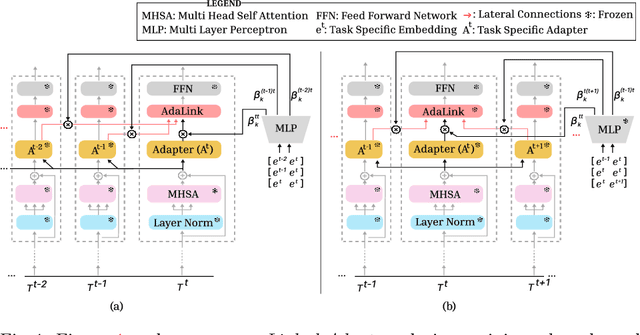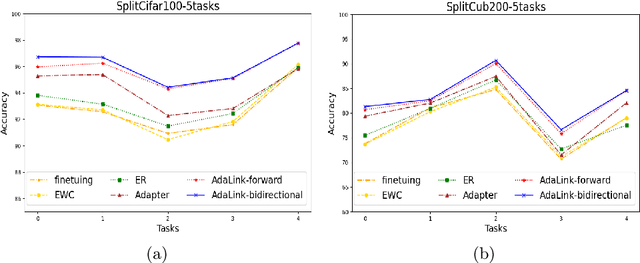Dupati Srikar Chandra
Linked Adapters: Linking Past and Future to Present for Effective Continual Learning
Dec 14, 2024



Abstract:Continual learning allows the system to learn and adapt to new tasks while retaining the knowledge acquired from previous tasks. However, deep learning models suffer from catastrophic forgetting of knowledge learned from earlier tasks while learning a new task. Moreover, retraining large models like transformers from scratch for every new task is costly. An effective approach to address continual learning is to use a large pre-trained model with task-specific adapters to adapt to the new tasks. Though this approach can mitigate catastrophic forgetting, they fail to transfer knowledge across tasks as each task is learning adapters separately. To address this, we propose a novel approach Linked Adapters that allows knowledge transfer through a weighted attention mechanism to other task-specific adapters. Linked adapters use a multi-layer perceptron (MLP) to model the attention weights, which overcomes the challenge of backward knowledge transfer in continual learning in addition to modeling the forward knowledge transfer. During inference, our proposed approach effectively leverages knowledge transfer through MLP-based attention weights across all the lateral task adapters. Through numerous experiments conducted on diverse image classification datasets, we effectively demonstrated the improvement in performance on the continual learning tasks using Linked Adapters.
Continual Learning with Dependency Preserving Hypernetworks
Sep 16, 2022



Abstract:Humans learn continually throughout their lifespan by accumulating diverse knowledge and fine-tuning it for future tasks. When presented with a similar goal, neural networks suffer from catastrophic forgetting if data distributions across sequential tasks are not stationary over the course of learning. An effective approach to address such continual learning (CL) problems is to use hypernetworks which generate task dependent weights for a target network. However, the continual learning performance of existing hypernetwork based approaches are affected by the assumption of independence of the weights across the layers in order to maintain parameter efficiency. To address this limitation, we propose a novel approach that uses a dependency preserving hypernetwork to generate weights for the target network while also maintaining the parameter efficiency. We propose to use recurrent neural network (RNN) based hypernetwork that can generate layer weights efficiently while allowing for dependencies across them. In addition, we propose novel regularisation and network growth techniques for the RNN based hypernetwork to further improve the continual learning performance. To demonstrate the effectiveness of the proposed methods, we conducted experiments on several image classification continual learning tasks and settings. We found that the proposed methods based on the RNN hypernetworks outperformed the baselines in all these CL settings and tasks.
 Add to Chrome
Add to Chrome Add to Firefox
Add to Firefox Add to Edge
Add to Edge